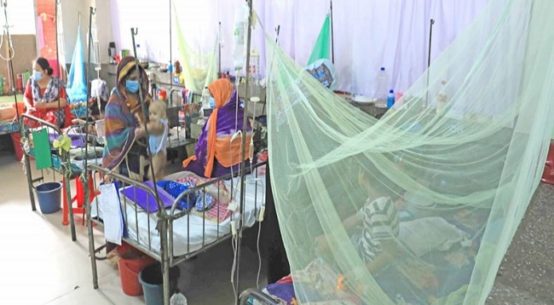USAID new Mission Director Reed AeschlimanThursday said, as a development partner, the US is keen to see a more resilient and prosperous Bangladesh.
“Regardless of what challenges we face, USAID is committed to standing with our Bangladeshi partners and working together for a more resilient and prosperous future,” he said at an interaction with journalists at the American Centre here.
He said strengthening democratic principles is a critical cornerstone in maximizing economic growth in any country.
Economic studies show that when it comes to growth, democracy significantly increases development – especially in health and human capital, he added.
“Our approach is to harness the power of the private sector more fully in achieving development goals,” said the USAID mission director.
He said public sector and development partners alone can’t stimulate growth to the scale needed for Bangladesh to become an upper-middle-income country.
“We have seen success in stimulating investments and extending financing opportunities to farmers and small businesses with support from the private sector,” he said.
In turn, Reed said, people have greater opportunities to invest in themselves and contribute more fully to this country’s economic growth prospects.
“We’ve been working together for over 50 years to help Bangladeshis lead brighter and more prosperous futures,” he said.
He said USAID will continue to invest in the Bangladeshi people – whether it’s building the skills of farmers, doctors, nurses, school teachers, or emergency responders – and equip people with the tools they need to prosper in life.
“Empowering people enables us to reach our ultimate objective to help Bangladeshis build a more resilient, democratic and prosperous society, in which all citizens have an opportunity to thrive,” he said.
The mission director said the USAID goal is to be a good partner for Bangladesh and make sure its approach is inclusive and collaborative.
“We also need to be inclusive of key segments of Bangladesh’s population – including youth, women and marginalized communities – so they can contribute to Bangladesh’s economic growth more fully,” he said.
USAID is expanding our investments to local institutions,” he said.
Reed said the USAID investments helped Bangladesh reduce maternal and child mortality by nearly 70 percent since 2000.
The United States donated nearly 115 million doses of COVID-19 vaccines and USAID was proud to partner with the Ministry of Health to train healthcare workers and provide support to help them save lives on the frontlines.
Over the last 20 years, he said, USAID has built 900 multipurpose shelters to protect people from cyclones, flooding and other disasters.
He said USAID-trained farmers and producers average combined sales between $500 million to $700 million U.S. dollars each year.

